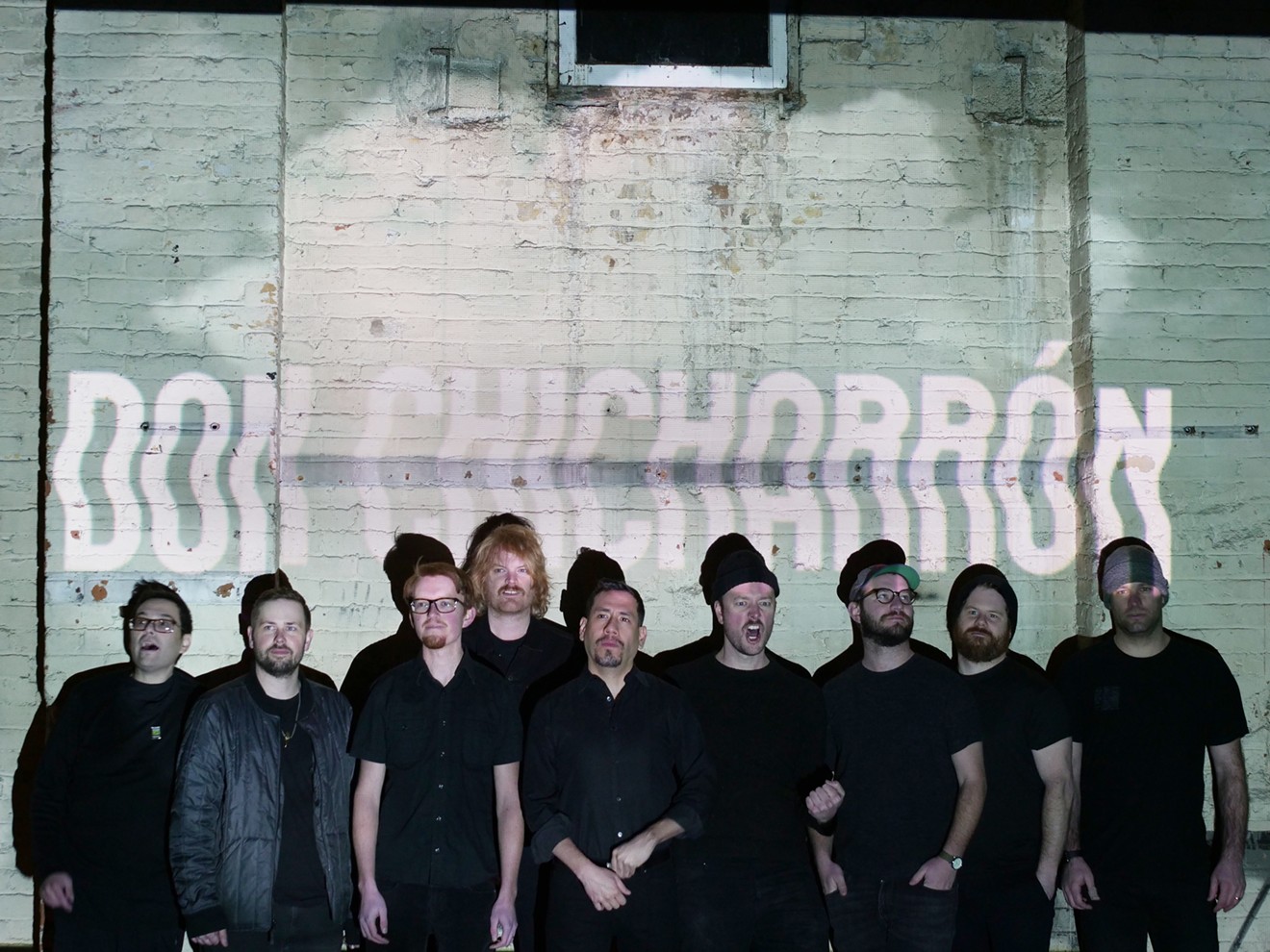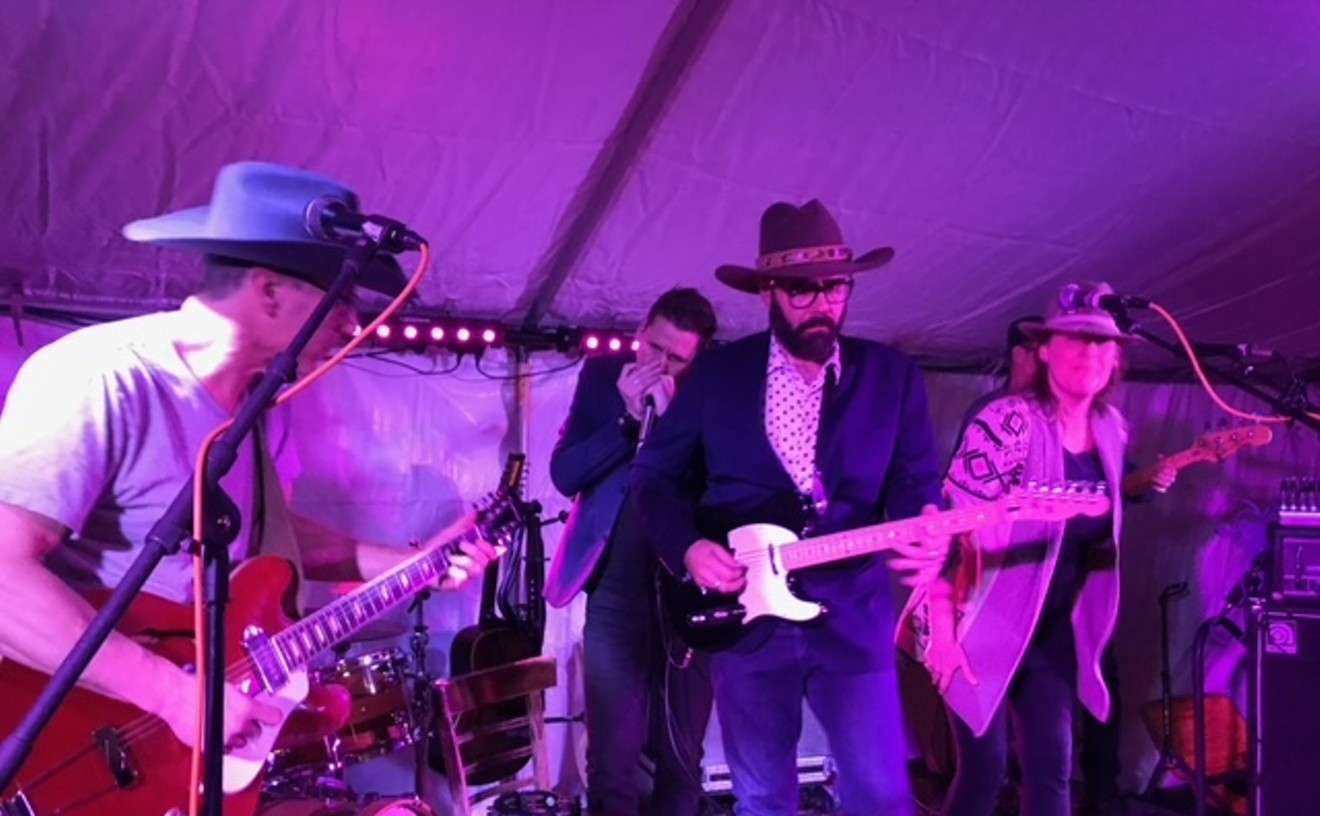“At least 50 percent of the audience are like, ‘I’ve never heard anything like this’ or ‘The Latin jazz stuff, right?’” says frontman Aldo Pantoja.
“They watched one season of Narcos, and they know some cumbia,” offers percussionist Nathan Fulton.
But Don Chicharrón does not play Latin jazz. The band plays chicha, a Peruvian subgenre of cumbia that emerged from Lima in the 1960s. With the notable influx of Spanish-speaking pop and hip-hop within the mainstream — “Despacito," anyone? — chicha's time may very well be now.
Chicha is also a drink, best described as moonshine’s Latin American cousin, made by distilling whatever distillable crop is on hand. (Corn is a popular choice.) You'll find it at aptly named chicha parties, which are characterized by their length, endless dancing and wild atmosphere. No need to know how to salsa or merengue; whatever steps you can manage will do. To Pantoja’s Peruvian father, chicha was “get-fucked-up-drunk music,” the soundtrack to parties teeming with ne’er-do-wells.
Raised in Colorado, Pantoja remembers encountering chicha parties from afar during trips to Lima with his family. His parents forbade their sons from attending.
“We’d hear it in the distance. We’d hear this fucking rager out there,” he recalls. “The music does not stop. It’s this sound emulating the jungle, the Andes, the cumbia.”
On paper, chicha is a classic case of musical fusion: ’60s psychedelia and surf rock, Andean folk and Afro-Cuban rhythms. It went largely unnoticed by the Western musical community until its unexpected contemporary resurgence via the release of a 2007 compilation album titled The Roots of Chicha: Psychedelic Cumbias From Peru, with Juaneco y Su Combo, Los Hijos del Sol and other prominent chicha musicians, several of them buoyed by the Discos Horóscopo label (which now enjoys something of a cult following).
Despite being the son of Peruvian immigrants, Pantoja says his musical upbringing did not include much chicha — at home, at least. His father loved indigenous folk music and crooners Julio Iglesias and José José, both of whom he describes as “these Frank Sinatras of South American-style ballads.” Left to his own devices, Pantoja pursued theater, moved to Baltimore, and played in the Valentones, delivering musical valentines on request.
“We would make a killing. It would be three days of just going around and singing ‘Rock With You,’ by Michael Jackson, outside on a porch,” he says.
It took a visit to his brother in Brooklyn to introduce Pantoja to chicha. His brother suggested they attend a show headlined by chicha legacy act Los Wemblers de Iquitos. Pantoja knew little about chicha — his New York plans were more in the Broadway vein — but he relented to appease his brother. The show was a revelation.
Newly inspired by the music and back in Denver after a job directing theater at Regis Jesuit High School, Pantoja reached out to his longtime friend Justin Horrigan and insisted that the pair start a chicha band. Horrigan agreed and came on as a guitarist. Fulton serendipitously returned to Denver from Baltimore around the same time and took minimal convincing to join up. Guitarist Tyler Breuer (best known as a member of local indie-rock outfit the Knew) saw Don Chicharrón’s first show at Honky Tonk Hodgepodge in northern New Mexico. That was enough for him.
“I’ve always had a kinship to Spanish-language music. I had just started to get into chicha, coincidentally,” says Breuer. “After I saw the band there, I was like, ‘I want to play the next show.’”
Within a handful of performances, the five-piece swelled to nine members, including keyboardist Tim Sauer and a rhythm section of Mike Walsh, Andre Martinez, E.J. Ulery and Stuart Confer.
“The songwriting for this band is the easiest part of being in it. It’s the communication and the coordination that’s challenging,” says Breuer, alluding to the extended group chats required to wrangle nine people into the same place at the same time.
Nonetheless, the group managed to find time to write and record its debut album, a ten-track danceable chicha juggernaut that dabbles in reggaetón, salsa, garage rock and dramatic guitar melodies fit for a spaghetti Western. (Sultry album closer “El Coyote” sounds like the lost theme from a Sean Connery-era James Bond film.) Contributors include Pantoja’s father, Paco, one of the band’s earliest and harsher critics.
“I grew up with Aldo’s dad. He was always a very nice guy, but he was a dad you were a little bit scared of,” remembers Horrigan.
The band invited Paco to the recording sessions anyway. He coached his son through the minutiae of his pronunciation — “Oh, he was such a stickler,” says Pantoja — and gave notes on authenticity and tone. He takes his own turn at the microphone on “De Mal Humor,” an impassioned protest against gun violence in schools.
Sometimes the music is the message — particularly for a Spanish-language band playing in the United States during an ongoing human-rights crisis at the southern border. Pantoja began the band’s set at Levitt Pavilion last summer with a performance of African-Slavic lullaby “Duerme, Negrito,” its Spanish lyrics intended for detained immigrant children. He ended the show with a plea to vote in the then-upcoming midterm elections for lawmakers trying to end family-separation policies.
The musicians maintain their sense of social justice even as they embrace the languid, carefree exuberance at chicha's beating heart. Pantoja, chicha and Don Chicharrón's only rule for fans is simple: "They'd better dance."
"Dance, think, dance," adds Fulton.
Don Chicharrón album-release show, 9 p.m. Saturday, February 9, hi-dive, $10, 7 South Broadway.











